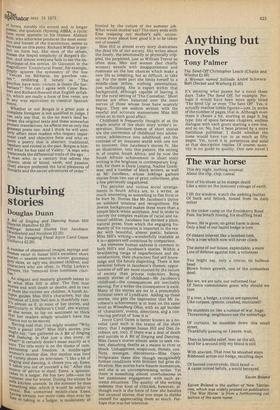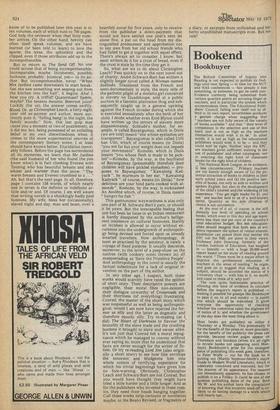Anything but novels
Tony Palmer
The Send-Off Christopher Leach (Chatto and Windus E1.60)
A Woman named Solitude Andre SchwarzBart (Secker and Warburg £1.95) It's amazing what passes for a novel these days. Take The Send Off, for example. Perhaps it would have been more aptly titled 'The Send Up' or even 'The Sent Off'. Yes, it actually reaches treble figures—just. In terms of the number of pages, that is. Although even there it cheats a bit, starting at page 9, big type, lots of space between chapters, endless dialogue with each grunt starting a new line, and so on. No, had it been printed by a more fastidious publisher, I doubt whether the tome would have run to as much as fifty pages. Yet, novel it is, portentous and solid as that description implies. Of course, quantity is no guide to quality. One new novel I
know of to be published later this year is in ten volumes, each of which runs to 700 pages. God help the reviewer when that little number arrives. On the other hand, brevity can often itself speak volumes, and we have learned (or been told to learn) to love the sparse, the terse, the aphoristic and the clipped, even if those attributes add up to the incomprehensible.
But to return to The Send Off. No one could accuse that of being incomprehensible. Incomparable, maybe. Incoherent, possibly Inchoate, probably. Inimical, yes— to its author. But incomprehensible, never. "When Mrs Jardine came downstairs to start breakfast she saw something wet seeping out from the kitchen into the hall", it begins. Aha! I hear you cry. A triffid? Quatermass? Sperm, maybe? The tension mounts. Beetroot juice? Luckily (for us), the answer comes swiftly. Blood. Or, as Christopher Leach, a forty-eight year old ex-painter and author, more succinctly puts it; "falling bang! in the night, the family soundo." Now, this last quip may cause you a moment or two of puzzlement, as it did me; but, being possessed of an unfailing belief in my own dimwittedness when it comes to the more experimental oeuvres of the contemporary literary scene, I at least should have known better. Elucidation inevitably follows. Before the page has surrendered all its mysteries, we learn that Mr Jardine (the said husband of her who found the you know what) is in fact climbing Everest with Tensing who has beautiful breasts and skin whiter and warmer than the snow. "The warm breasts and Everest crumbled to a . ." Ah, but that's the next page. In all, therefore,
page 1 contains 158 words, of which nearly one in seven is the definite or indefinite article and/or and. Of course, I am well aware that writing novels is a shockingly badly paid business. My wife, bless her (occasionally), slaved night and day, man and beast, over a heartfelt novel for five years, only to receive from the publisher a down-payment that would not have settled one year's rent let alone five, a pat on the head from my distinguished predecessor and approbation not to say awe from her old school friends who had failed to get it together with equal effect. There's always art to consider, I know, but most writers do it for a crust of bread, even if the crust is stale by the time they get it.
So, what are we to do about Christopher Leach? Pass quickly on to the next novel out of charity. Andre Schwarz-Bart has written a slightly longer novel called A Woman named Solitude. Translated from the French and semi-documentary in style, the story tells of the pathetic plight of a mulatto girl conceived in slavery on Guadeloupe, sold at a public auction to a fascistic plantation thug and subsequently caught up in a general uprising against the French invader during which she is executed immediately after the birth of her child. I doubt whether even Enid Blyton could have written up the terrors of slavery more dispassionately. Solitude's mother, for example, is called Bayangumay, which in Diola (we are told) means "she whose eyelashes are transparent". Bayangumay is also called Utili ban Ulin, which of course means (in Diola) "you are fat but your weight does not impede your movements". Komobo, which in Diola means "you whose flesh is made to be pickled"—Komobo, by the way, is the boyfriend of Bayangumay (presumably therefore their children will have pickled eyelashes) — proposes to Bayangumay. " Kawalong Kadyack ", he murmurs in her ear. " Kawalong Kadyack ", of course, means (in Diola) " how delicious are your hind parts cooked with almonds ". Komobo, by the way, is nicknamed An Asulene which, of course, in Diola means "hungry for fish ".
This gastronomic waywardness is alas only one part of M. Schwarz-Bart's yarn, or should it be yawn. But the inescapable feeling that one has been let loose in an Indian restaurant is hardly dissipated by the author's belligerent insistence on cultural footnotes. Hardly an incident is allowed to occur without excursions into the undergrowth of anthropology being devised and forced upon us already wearied travellers. Now anthropology, at least as practised by the amateur, is rarely a voyage of fixed purpose. It usually descends, moreover, to the level of a peep-show on the natives (with cookery notes thrown in) all masquerading as 'Save the Primitive People'. And anthropology in the novel is usually the factual substititute for a lack of original invention on the part of the author.
In any other age, I suspect, both these works would scarcely have rated the epithet of short story. Their descriptive powers are negligible, their moral fibre non-existent, their dialogue unworthy of Crossroads and their shortness (of everything) frustrating. Conrad, the master of the short story. which was suspenseful as well as being anthropological, would I am sure have rejected the former as silly and the latter as dogmatic and therefore equally silly. Try re-reading (as did) The Heart of Darkness to flavour the brutality of the slave trade and the crushing burdens it brought to slave and owner alike. It's not just that Conrad felt a moral repugnance which he managed to convey without ever saying so, more that he understood that facts are never enough for the writer of fiction. Or try re-reading Lord Jim (also originally a short story) to see how fate envelops the innocent and bludgeons him into whole oceans of terrifying experience for which his trivial beginnings have given him no fore-warning. Obviously, Christopher Leach and Schwarz-Bart are not Conrad. But you would have thought they might have tried a little harder and a little longer: And as for the publishers who invested in these comics, they need their heads banging together. Call these works strip-cartoons or novelettes maybe; or the Beano Revised, or fragments of a diary, or excerpts from unfinished and hitherto unpublished manuscripts even. But novels?



































 Previous page
Previous page